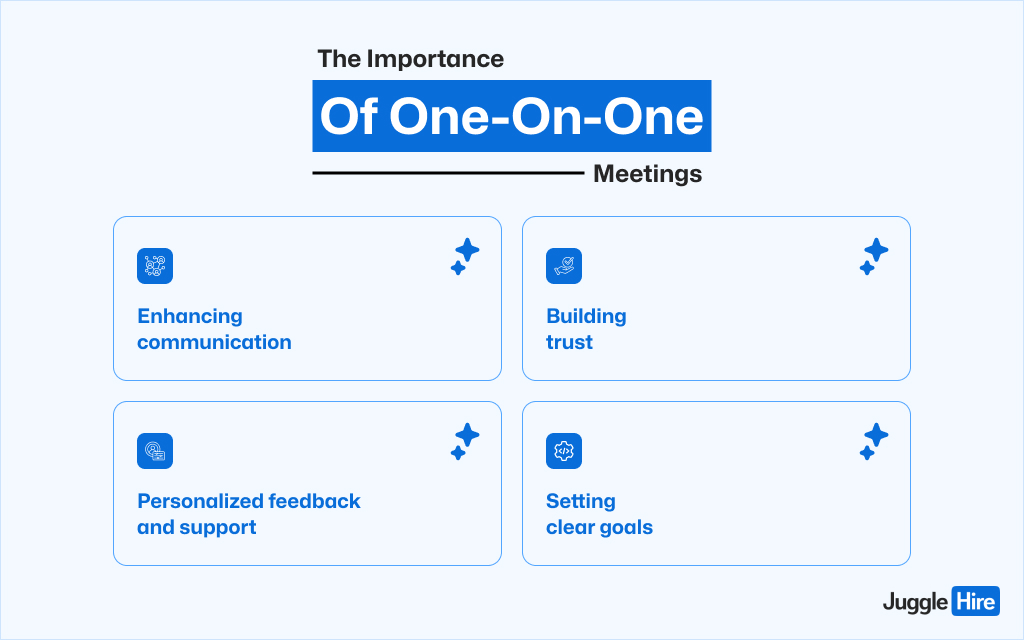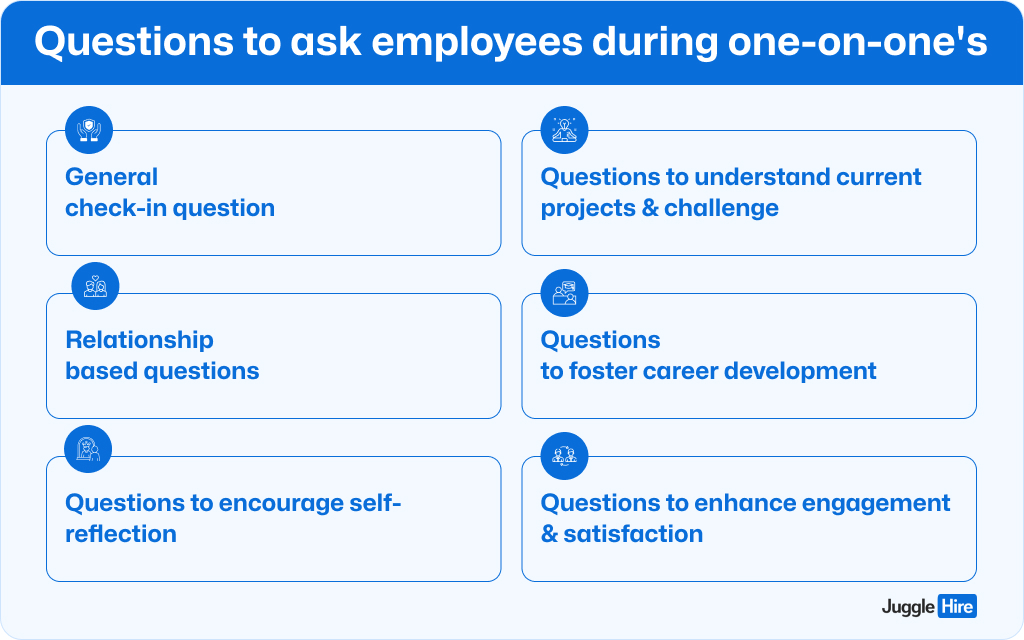Common Questions to Ask in One on One’s

Do your one-on-one meetings feel unproductive or disconnected? Many managers struggle with making these sessions engaging and productive, leading to wasted opportunities for growth and improvement. Misunderstandings persist, goals become muddled, and employee motivation can wane.
Also, studies say, 1:1s are your single best opportunity to listen, really listen, to the people on your team to make sure you understand their perspective on what’s working and what’s not working.
So, you understand the importance! Our guide offers a powerful solution. It provides you with the essential questions to ask in one on one’s to employees.
It also offers strategies needed to turn every one-on-one into a catalyst for trust, clarity, and professional development.
The Importance of One-on-One Meetings

One-on-one meetings are crucial in any workplace. They provide a private setting where you, as a manager, can engage directly with your employees. These discussions can cover a variety of topics, including job performance, workplace challenges, and professional goals. Having regular one-on-one meetings is beneficial for several reasons:
- Enhancing Communication
One on one meetings facilitate open communication. It allows you to clarify expectations and address any misunderstandings promptly. They ensure that both you and your employees are aligned in terms of objectives and workflows.
- Building Trust
These meetings also build trust. When your employees see that you are willing to listen to their concerns and value their input, they feel more secure and respected at work. This trust fosters a positive work environment where your employees are more engaged and motivated.
- Personalized Feedback and Support
Additionally, one-on-one meetings allow you to provide personalized feedback and support. You can tailor your advice and assistance to the specific needs of each employee. This individual attention can help your employees grow in their roles and tackle any issues they face with more confidence.
- Setting Clear Goals
One-on-one meetings also aid in setting clear goals and expectations. When your employees know exactly what is expected of them, they can better focus their efforts and improve their productivity.
Overall, one-on-one meetings are a key tool for effective management. They help maintain a supportive and productive work environment, where employees feel valued and you can efficiently guide your teams.
Questions to Ask in One on One’s

When you sit down for a one-on-one meeting, it’s important to ask the right questions. These questions help you understand how your employees feel about their work, their goals, and the challenges they face. By choosing the right questions, you can make the most of these meetings.
This not only helps you manage more effectively but also shows your employees that you are invested in their success and well-being. Here are some categories of questions to consider:
1. General Check-in Questions
Start your one-on-one meetings with general check-in questions. This part of the conversation helps you understand how your employee feels about their work and personal life.
By asking these questions, you set a welcoming tone and show that you care about their overall well-being. This encourages open communication and makes employees feel valued right from the start of the meeting. Examples include:
- “How are you feeling today?”
- “What has been the highlight and lowlight of your week so far?”
- “Is there anything in particular you’d like to discuss today?”
Asking these questions shows employees that their overall well-being is important to you. It gives them an opportunity to express concerns or share personal achievements that might not be directly related to work but affect their morale and productivity.
By starting the meeting with these questions, you can create a trusting atmosphere that encourages open communication.
2. Questions to Understand Current Projects and Challenges
It’s important to understand the details of what your employee is working on and the challenges they are facing. These questions allow you to get a clear picture of their current projects and any obstacles they might be encountering.
With this information, you can offer specific support and resources to help them overcome these challenges and improve their performance. Examples include:
- “Can you update me on the progress of your current projects?”
- “What challenges are you currently facing with your projects?”
- “Is there anything that could be changed to help you complete these projects more effectively?”
- “Are there any resources you need that you currently don’t have?”
- “How are you prioritizing your tasks, and can I help in rearranging them?”
These questions help you identify any roadblocks your team members are encountering. You can effectively provide necessary guidance or resources to help overcome them.
Understanding the specifics of what the employee is working on also allows you to offer more targeted advice and support. It will ultimately lead to more productive and successful project outcomes.
3. Relationship-based Questions
Asking relationship-based questions helps strengthen the bond between you and your employee. These questions are aimed at building trust and understanding how the employee feels about the team dynamics and your management style.
By discussing these topics, you can identify ways to improve communication and support, fostering a more positive and productive work environment. Examples include:
- “Do you feel you’re getting enough support from me?”
- “What can I do better as your manager to help you succeed?”
- “Are there any areas where you’d like more or less direction from me?”
- “How can we improve our collaboration to make our team more effective?”
These questions are vital for building a positive working relationship. They allow employees to give feedback on your style and approach. Thie can lead to improved communication and understanding between both parties.
By regularly asking these types of questions, you can ensure you’re meeting the needs of your employees.
4. Questions to Foster Career Development
Focusing on career development is vital in supporting your employee’s long-term aspirations. These questions allow you to explore their professional desires and plan pathways to achieve them.
By understanding what skills they wish to develop or roles they are curious about, you can guide them toward meaningful opportunities within the organization. This not only helps in their growth but also aligns their ambitions with the company’s goals. Ask questions like:
- “What skills would you like to develop?”
- “Are there any roles or projects you are interested in exploring?”
- “What part of your job do you enjoy the most and why?”
- “Where do you see yourself in the next two to five years?”
- “How can I assist you in achieving your career goals?”
Engage in discussions that can lead to actionable plans such as training, new project assignments, or role transitions that support your employee’s career trajectory.
5. Questions to Enhance Engagement and Satisfaction
It’s crucial to understand how engaged and satisfied your employees feel at work. Engaged employees often show higher productivity and are less likely to leave the company.
These questions help you gauge their motivation and satisfaction levels, allowing you to identify and address any factors that might enhance their workplace experience. Understanding what drives them and how they prefer to be recognized can help you create a more motivating and supportive environment.
- “What motivates you to come to work each day?”
- “Do you feel your talents are being utilized effectively?”
- “What aspects of your job would you like to change?”
- “How do you prefer to receive recognition for your work?’
- “What would make your day-to-day work more enjoyable?”
By identifying what they value and what changes they desire, you can work to increase their satisfaction and deepen their connection to their work and the company.
Also Read: Remote Hiring Tips: How To Attract, Hire and Retain Remote Employees
6. Questions to Encourage Self-Reflection
Encouraging self-reflection helps employees assess their performance and behavior in the workplace. These questions prompt them to consider their recent accomplishments and challenges, providing insights into their own growth and areas for improvement.
Self-reflection is a key component of professional development, as it enables individuals to consider their career trajectory and set personal objectives.
- “What do you consider your biggest accomplishments and challenges this year?”
- “How do you think you can improve in your current role?”
- “What lessons have you learned from the challenges you’ve faced?”
- How has your approach to work changed over the past year?”
- “What goals would you set for yourself for the next quarter?”
Encourage them to share their thoughts openly, which can foster a growth mindset and lead to discussions about developmental opportunities and support.
7. Forward-Looking Questions
Forward-looking questions are essential for preparing both you and your employee for what lies ahead. These questions focus on upcoming projects, potential challenges, and the alignment of team goals with company objectives.
By discussing future plans and resources needed, you help your employees feel more prepared and ensure their efforts are aligned with the strategic direction of the business.
- “What projects are you looking forward to in the coming months?’
- “Are there any potential challenges we should prepare for now?”
- “How can we better align our team’s goals with the company’s objectives?”
- “What changes or resources would help you manage your workload better?”
- “What can we do to improve our planning and execution processes?”
These questions help both you and your team members anticipate and prepare for future challenges, ensuring everyone is well-equipped and strategically aligned for upcoming tasks. This proactive approach promotes a smoother workflow and better team performance.
Each set of questions is designed to tackle different aspects of an employee’s professional life, providing a comprehensive approach to engage and support them, enhancing both individual and team productivity in a fulfilling work environment.
Questions to Ask in One on One’s: Wrapping Up
In conclusion, one-on-one meetings are a vital tool for effective management. By asking thoughtful and targeted questions, you can gain valuable insights into your employees’ experiences, aspirations, and concerns.
These meetings not only enhance communication and build trust but also foster a supportive and engaged workplace.
Ultimately, regular one-on-one discussions are key to nurturing a strong, productive team and creating a positive work environment where everyone feels valued and equipped to succeed.
